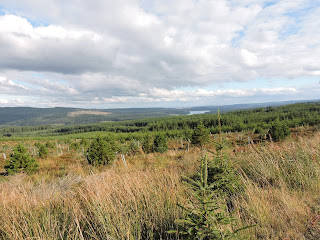 |
| Kielder Observatory in a landscape free of light pollution |
As
we approached the autumn equinox, the darkening evening skies gave
me the notion to seek out the dark skies, away from light
pollution, to get a proper view of the night sky.
There
are children and probably, adults in this country who have never seen
the Milky Way, the "basket handle", arching across above
us, the end-on view of our galaxy, our own wee spot in the universe.
Just
down the road from us is the Northumberland National Park with its
Dark Sky areas.
The
whole area is outstandingly beautiful and around Keilder there is a
concentration of spots to star gaze.
 |
| Skyspace viewing point |
I
booked into a great B&B* and settled down to have an evening with
the stars. Unfortunately, the observatory was booked for a private
event so I was thrown back on my own resources but my hosts made two
telescopes available and I had my binoculars.
The
gods smiled upon me and the skies cleared for a great view of the
southern sky. I am no expert but managed to find the square of
Pegasus. Thank goodness for Perseus' mother-in-law, Cassiopeia. The
elongated W of her constellation is always easily found and acted as
a starting point.
The
planets were all too low in the sky for me to see them. At least I
think that was why I couldn't find them but as I said I have no
expertise only enthusiasm. So, no Mars, Jupiter, Venus or Mercury. None of the old gods were on view.
The
next day, full of classical allusions from the heavens, and, being in
the area, I drove along the stretch of road that runs, like all Roman
roads, in a dead straight line following Hadrian's Wall.
 |
| The straight Roman road and wall |
At
Vindolanda, robbed of its stone over the centuries, you can still
catch a glimpse of the might and power of the conquerors. They
didn't last. No empires do. Still, the site was occupied for over
three hundred years... about six generations or more... a time as
long as from the Union of the Parliaments, the creation of Great
Britain, until now, except there was no Scotland or England or United
Kingdom then. It was Britannia - the most northern province of the
Roman Empire. Nations are mere accidents of history
What
intrigued me most was a soldier's worn out boot, a caligula,
recovered from the rubbish in the ditch and now in the museum. It
had once marched along the road I had just driven or stood guard on
the fort wall above. Its owner would have shivered in the cold wind
from the north and might have looked up at the same stars as I did.
There would have been no problem of light pollution for him as he
stood on the ramparts.
The
legions and cohorts manning the fort seem to have been mostly Gallic.
Batavians, Nervians, and Tungrians drawn from what is now the
Netherlands and Belgium so the climate wouldn't have been much
different to their home but they would have had different names for
the constellations. No Greek mythology for them.
Did
they see their gods in the skies?
There are temples to various deities on the Vindolanda site but their stones are mute.
There are temples to various deities on the Vindolanda site but their stones are mute.
 |
| Temple of Jupiter Dolichenus |
I
must return to the dark skies later in the year.



No comments:
Post a Comment